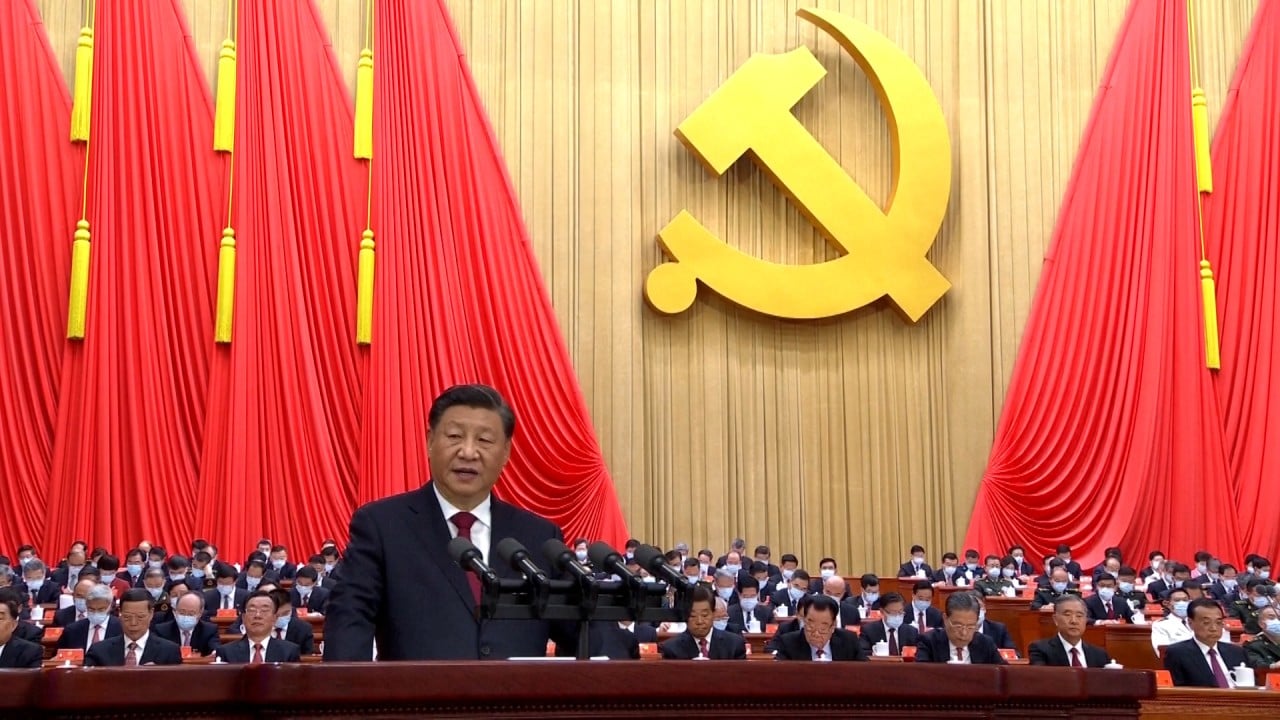
Exclusive | China’s ideology tsar Wang Huning tipped to head the National People’s Congress
- Wang is already a core member of the Politburo Standing Committee and could rise up the order as many other faces change
- The theorist is one of the architects of Xi Jinping’s ‘Chinese dream’ concept
This would make him a rare veteran in Xi’s new core team as the president brings in fresh blood for his rule for the next five years and beyond.
Wang, the fifth-ranking party official and the first secretary of the secretariat responsible for the day-to-day operation of party affairs, is now tipped to head the National People’s Congress (NPC), China’s legislature.
The NPC chairman is normally headed by the party’s second or third-ranking official and comes with great political clout.
The NPC holds the final interpretation authority of Hong Kong’s Basic Law – the legal foundation of the city’s “one country, two systems” political framework.
Wang, who is already a member of the Politburo Standing Committee, would become a symbol of continuity in China’s bigger-than-expected power reshuffle.
As many as four of the seven members of the Politburo Standing Committee could retire and half of the Central Committee seats change hands.
The Politburo Standing Committee, headed by Xi, is the highest decision-making body. Wang is now tipped to transit to the new Standing Committee, which will be formally unveiled on Sunday.
This week’s congress will decide the leadership and hierarchy of the party. Changes in key government and parliamentary posts – such as the premier and NPC chairman – will be confirmed later. But the party hierarchy order would give the clearest indication of who will get what.
Considered “the brains behind the throne” in Chinese politics, Wang has been credited with being one of the architects of Xi’s “Chinese dream” concept, a widely promoted vision for the rejuvenation of Chinese civilisation.
He is also the mastermind behind former president Jiang Zemin’s “Theory of Three Represents” and Hu Jintao’s “Scientific Outlook on Development”.
These have both been written into the party’s constitution, which will again be revised at the congress this week.
The 67-year-old academic-turned-politician headed the Central Policy Research Office – a party think tank – for 15 years before his elevation to the party’s top leadership in 2017.
Wang’s background makes him a rare combination of national policy adviser, chief speech-writer and principal theorist to the country’s top leader.
Soft-spoken and mild-mannered, Wang often accompanies Xi on important state visits and inspection trips. He was with the president for Xi’s trip to Hong Kong in July for the 25th anniversary of the city’s return to China.
Wang is also an expert in international relations, and if he becomes the NPC chairman as predicted, he could play an instrumental role in realising Xi’s grand strategy laid out in his work report delivered on Sunday.
Xi promised to deliver China to the leading position among global powers by 2049, when the People’s Republic celebrates its centennial, and to do so by charting China’s own path and not following the Western model.
All these are ideas put forward by Wang even before entering politics.
Published in 1991, the out-of-print book suddenly became popular last year after Chinese political experts rediscovered its forecast of US decline due to its emphasis on “individualism, hedonism and democracy”.
“The American system is generally based on individualism, hedonism and democracy, but it is clearly losing out to a system of collectivism, altruism and authoritarianism. Perhaps Americans would rather lose out economically than give up their system,” Wang wrote in the chapter on how the US was challenged economically by Japan.
“This system guarantees the fulfilment of faith and also a certain degree of prosperity for society. Today’s world situation seems to indicate that this system is hardly a guarantee of America’s most developed status.”
Wang was best known for being the youngest associate professor – specialising in international relations – at Fudan University in Shanghai, a position he achieved at the age of 30 after starting his academic career with a bachelor’s degree in French.
The seeds of his political ideology can be found in his earlier publications.
In the 1980s, Wang promoted the idea that a centralised government could maintain stability and drive growth while gradually expanding its democratic principles from within.
His article “Analysis on the Ways of Political Leadership During the Modernisation Process”, first published in 1986, is thought to have brought Wang to the attention of Jiang, who became president in 1989 in the wake of the Tiananmen crackdown.
“For the time being, centralised decision-making power and modernisation is more politically efficient,” he wrote. “This model has achieved stunning economic results.”
In his memoir Political Life, published in 1994, Wang said his goal in life was to keep writing books and teaching students.


